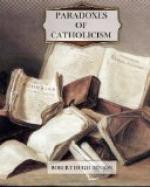(i) He begins to read, of course, with the assumption that this Life is as others and this Man as other men; and as he reads he finds a hundred corroborations of the theory. Here is one, born of a woman, hungry and thirsty by the wayside, increasing in wisdom; one who works in a carpenter’s shop; rejoices and sorrows; one who has friends and enemies; who is forsaken by the one and insulted by the other—who passes, in fact, through all those experiences of human life to which mankind is subject—one who dies like other men and is laid in a grave.
Even the very marvels of that Life he seeks to explain by the marvellous humanity of its hero. He can imagine, as one such inquirer has said, how the magic of His presence was so great—the magic of His simple yet perfect humanity—that the blind opened their eyes to see the beauty of His face and the deaf their ears to hear Him.
Yet, as he reads further, he begins to meet his problems. If this Man were man only, however perfect and sublime, how is it that His sanctity appears to run by other lines than those of other saints? Other perfect men as they approached perfection were most conscious of imperfection; other saints as they were nearer God lamented their distance from Him; other teachers of the spiritual life pointed always away from themselves and their shortcomings to that Eternal Law to which they too aspired. Yet with this Man all seems reversed. He, as He stood before the world, called on men to imitate Him; not, as other leaders have done, to avoid His sins: this Man, so far from pointing forward and up, pointed to Himself as the Way to the Father; so far from adoring a Truth to which He strove, named Himself its very incarnation; so far from describing a Life to which He too one day hoped to rise, bade His hearers look on Himself Who was their Life; so far from deploring to His friends the sins under which He laboured, challenged His enemies to find within Him any sin at all. There is an extraordinary Self-consciousness in Him that has in it nothing of “self” as usually understood.
Then it may be, at last, that our inquirer approaches the Gospel with a new assumption. He has been wrong, he thinks, in his interpretation that such a Life as this was human at all. “Never man spake like this man.” He echoes from the Gospel, “What manner of man is this that even the winds and the sea obey Him? How, after all,” he asks himself, “could a man be born without a human father, how rise again from the dead upon the third day?” Or, “How even could such marvels be related at all of one who was no more than other men?”
So once more he begins. Here, he tells himself, is the old fairy story come true; here is a God come down to dwell among men; here is the solution of all his problems. And once more he finds himself bewildered. For how can God be weary by the wayside, labour in a shop, and die upon a cross? How can the Eternal Word be silent for thirty years? How can the Infinite lie in a manger? How can the Source of Life be subject to death?




